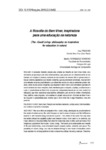Mostrar o rexistro simple do ítem
A filosofia do Bem Viver, inspiradora para uma educação na natureza
| dc.contributor.author | Pinheiro Christino Netto, Inez | |
| dc.contributor.author | Fernández Herrero, Beatriz | |
| dc.date.accessioned | 2019-07-12T08:07:55Z | |
| dc.date.available | 2019-07-12T08:07:55Z | |
| dc.date.issued | 2018 | |
| dc.identifier.citation | Pinheiro, I., & Fernández Herrero, B. (2019). The «Good Living» philosophy: an inspiration for education in nature. Sarmiento. Revista Galego-Portuguesa De Historia Da Educación, 22, 117-131. https://doi.org/10.17979/srgphe.2018.22.0.5482 | es_ES |
| dc.identifier.issn | 1138-5863 | |
| dc.identifier.uri | http://hdl.handle.net/2183/23514 | |
| dc.description.abstract | [RESUMO] O presente trabalho propõe uma análise da filosofia do Bem Viver como uma alternativa ao paradigma da vida contemporânea, que passa por um distanciamento do ser humano em relação à natureza, centrado no uso abusivo da mesma. Não é apenas uma crítica ao sistema capitalista e ao modelo ocidental, que se pretendem universais, mas também uma reflexão sobre as possibilidades que diferentes modos de vida já existentes podem oferecer, como os dos povos indígenas, que inspiram o Bem Viver e nos convidam a pensar em novos modelos de vida e relações, mais orientados para o respeito, a justiça, a solidaridade e a paz. A possibilidade do Bem Viver só pode ser conquistada através de um novo modelo de educação, que deve abandonar sua doutrina unificadora para se tornar crítica e libertadora. Para justificar essa proposta, uma análise do projeto educacional «Escolas de Bem Viver» do Equador é apresentada para mostrar que o Bem Viver não é algo irrealizável, mas sim possível. | es_ES |
| dc.description.abstract | [Abstract This work offers an analysis of the «Good Living» philosophy as an alternative to the model of contemporary life, which focuses on man’s abuse of nature and his indifference towards it, with humans being considered superior – the center of the world. Not only does the article criticize the capitalist system and western model, which claim to be universal, but it also reflects on the possibilities that other life styles may have to offer, such as those of the indigenous populations that inspire «Good Living». This leads us to contemplate new models of life and relationships, more orientated towards respect, justice, solidarity and peace. The possibility of «Good Living» can only be obtained through a new model of education, which must abandon its unifying doctrine in order to become a critical, liberating example. Therefore, in justification of this proposal, an analysis of the educational project «Good Living schools» in Ecuador has been carried out to demonstrate that it is not an unattainable goal, but rather, well within our possibilities. | es_ES |
| dc.language.iso | por | es_ES |
| dc.publisher | Universidade da Coruña | es_ES |
| dc.relation.uri | https://doi.org/10.17979/srgphe.2018.22.0.5482 | es_ES |
| dc.rights | Atribución-CompartirIgual 4.0 España | es_ES |
| dc.rights.uri | http://creativecommons.org/licenses/by-sa/3.0/es/ | * |
| dc.subject | Bem Viver | es_ES |
| dc.subject | Relação ser humano-natureza | es_ES |
| dc.subject | Justiça social | es_ES |
| dc.subject | Altermundialismo | es_ES |
| dc.subject | Culturas originárias | es_ES |
| dc.subject | Educação | es_ES |
| dc.subject | Good living | es_ES |
| dc.subject | Human-Nature relationship | es_ES |
| dc.subject | Social justice | es_ES |
| dc.subject | Alter-globalism | es_ES |
| dc.subject | Indigenous people | es_ES |
| dc.subject | Education | es_ES |
| dc.title | A filosofia do Bem Viver, inspiradora para uma educação na natureza | es_ES |
| dc.title.alternative | The «Good Living» philosophy: an inspiration for education in nature | es_ES |
| dc.type | info:eu-repo/semantics/article | es_ES |
| dc.rights.access | info:eu-repo/semantics/openAccess | es_ES |
| UDC.journalTitle | Sarmiento: Anuario galego de historia da educación | es_ES |
| UDC.volume | 22 | es_ES |
| UDC.startPage | 117 | es_ES |
| UDC.endPage | 131 | es_ES |






